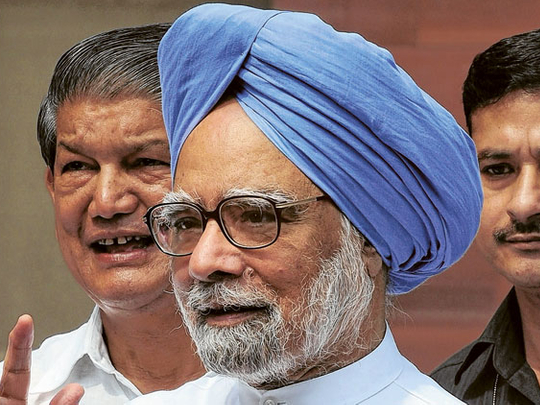
‘Life’s but a walking shadow, a poor player
That struts and frets his hour upon the stage
And then is heard no more.’
(Macbeth, Scene V)
Shakespeare’s tragic hero had to endure the ordeal of his hubris for far too long to be able to come to the conclusion that life is as fragile as a candle and most of us, if not all, will be forgotten over a period of time.
For an astute economist and academic like Dr Manmohan Singh, enduring the embarrassment and compulsions of coalition politics for most of his second term as India’s Prime Minister was little short of a hubris. Slowly, but surely, the chief architect of India’s watershed economic reforms was emerging ‘a poor player’ on the political stage with his constant dithering and perceived “policy paralysis” at taking the world’s largest democracy ahead with a definitive road map for fresh economic reforms. His academic brilliance and vast knowledge of the subject were being sacrificed, day in and day out, at the altar of political realism. Keeping the United Progressive Alliance (UPA) partners happy was his primary concern, in order to keep the UPA gravy train chugging along until at least the next general elections in 2014. And with that, economist and Cambridge-Oxford scholar Dr Manmohan Singh was gradually relegated to the backseat as the image of Prime Minister Manmohan Singh took centre stage with all its political frailties and limitations.
But September 14, 2012, marked a remarkable change in the script of a hitherto hackneyed act as Singh seemed determined to break free from the shackles of running a coalition government and push for reforms like the way he did in the summer of 1991 when he was the Union finance minister. Allowing 51 per cent Foreign Direct Investment (FDI) in multi-brand retail and opening up the Indian aviation sector for 49 per cent FDI were among a slew of measures announced by the government last Friday to shore up India’s economic growth and boost investor confidence.
Announcing the decisions after the Cabinet meeting late on Friday afternoon, Singh’s words were carefully chosen and for the first time in his second term as Prime Minister, the ever so mild-mannered, soft-spoken resident of 7 Racecourse Road (the official residence of the Indian Prime Minister in New Delhi) had an uncharacteristic ring of aggression in the verve and tenor of his words. “If we have to go down, let’s go down fighting,” a desperate Singh reportedly told his Cabinet colleagues, realising that the political ramifications of such radical reform measures can be fatal for his party and government — both having been confined to the ICU, so to speak, for some time now, following a string of electoral debacles and corruption scandals amounting to billions of rupees.
The decision to open the doors for FDI in multi-brand retail had been accepted, in principle, by the UPA government last November itself. However, primarily in the face of strident opposition from Trinamool Congress — the principal ally of the Congress-led coalition — the decision was pushed to the back burner.
In the meanwhile, the UPA government was mired in one scam after another, the latest being the inappropriate allocation of coal blocks, that even had the PMO (Prime Minister’s Office) dragged into the cesspool. While rupee touched a new nadir, the flight of foreign capital from Indian markets and adverse outlook from the rating agencies made it quite clear that the targeted annual growth rate of eight per cent was not just unrealistic but improbable.
Hamstrung with such unrelenting, and at times impractical, allies like Trinamool Congress on the one hand and a growing discontent among the electorate about his own party on the other, Prime Minister Singh was reduced to a ‘poor player’, a ‘walking shadow’ with little or no powers to resuscitate India’s economy. As Singh’s grip over governance loosened, he ended up earning such hurtful epithets as “Doctor of Drift” and the “Underachiever” from a section of the national and international media.
With less than two years to go for the next parliamentary polls in 2014, the “Doctor of Drift” must have told himself: ‘Enough is enough’. Even at the cost of inviting the wrath of his alliance partners, he decided to go ahead with a sequel to his 1991 dream budget. He knew it full well that allowing FDI in multi-brand retail was one issue that would never have a consensus emerging from within the UPA. He also knew that his radical push for change may even result in a premature end to his government. Yet, instead of ‘strutting’ and ‘fretting’ his ‘hour upon the stage’ like a Shakespearean tragic hero, Dr Singh decided to bite the bullet and write one last prescription for a jaundiced economy and a comatose government.
The reforms of 1991 have brought India enduring benefits. The jury is still out on the full impact of the reforms of September 2012. But one thing is sure: Economist Manmohan Singh will never let Prime Minister Manmohan Singh to be forgotten over time.








